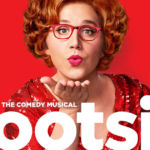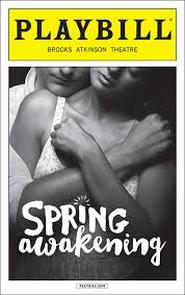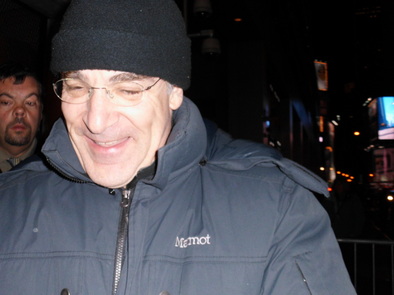 Race Like You’re a Contestant on ‘Race to Bachelor Island’ to See the Hilarious ‘Tootsie’by Randi / July 2, 2019
Race Like You’re a Contestant on ‘Race to Bachelor Island’ to See the Hilarious ‘Tootsie’by Randi / July 2, 2019It’s Theatre Thursday! Today’s show is the play Sweat by Lynn Nottage, currently playing at London’s Gielgud Theatre until July 20.
You know how society as we know it is falling apart and there’s nothing we can really do about it, so decent (and not so decent, but no one deserves the crumbling of the world) people are suffering in poverty and drug addiction and racism and sexism and classism and overall misery, and we need governments to work together for the people in order to solve any of these societal problems but the people running things are too busy thinking about their own comforts instead of caring about anyone else, let alone all of society, so things are just falling apart for the regular person and it’s all incredibly depressing? Yeah, well, so, Sweat.
Lynn Notage’s highly distressing, highly moving play about Reading, Pennsylvania and the devastation caused by joblessness (as well as the aforementioned –isms) is a hell of a depressing show. Nottage interviewed real citizens of Reading (not including Michael Scott) to research this show, since Reading has notably experienced a horrible decline in employment and 40% of the population now lives in poverty. I don’t know how many times I can say ‘depressing’ in one review but we will probably break that record today. Sweat shows us the lives of a small group of friends and acquaintances in Reading before and after all their lives changed for the worse.
This group consists of people who work at the big factory in town, people who used to work at the big factory in town, and their kids who have little choice but to also work at the big factory in town: Martha Plimpton’s volatile Tracy and her equally hot-tempered son Jason (stereotypical and scarily accurate central-PA white people who probably voted for the cheeto toilet); management-material Cynthia and her son Chris (black people who have to work harder to prove themselves), plus their estranged husband/father who is now an addict; their floaty old-hippie now-drunk friend Jessie; the bartender friend Stan; the bar’s Mexican busboy Oscar; and the good-intentioned parole officer. Yes, parole officer: the show begins with the kids, Jason and Chris, just released from prison. The rest of the show – before returning depressingly (there’s another!) to present day – shows us what led up to their arrest.
If this sounds compelling to you, well good, because we are all living in this world, and Sweat felt like a genuine reflection of the hardships of the working class, from the fear of how quickly joblessness can destroy your life, to America’s opioid epidemic, to how this fear to have someone real to blame for your lot in life can so easily lead to blaming those who are different from you. As someone who tries to focus on making her social justice efforts intersectional, I found a lot of this show a gut-punch of a reminder that some other people who we write off as not caring about people different from them simply don’t have the ability, the time, the luxury of caring about anything except working enough to make enough money to feed themselves to stay alive and then repeat the next day, and all their next days. It doesn’t make them good or bad people (well, some of them are bad people); it just makes for a world where caring for each other isn’t seen as a priority, and so we’re stuck in this vicious cycle of shit.
Nottage’s nuanced playwriting shines best as she develops these characters, along with a pretty remarkable cast. Plimpton was of course incredible, but she scared the absolute shit out of me. She was 100% exactly like some people I’ve met. She even looked exactly like a woman I used to work with: same exact fake blonde hair and gruff demeanor and ease of saying suuuper racist things. She was like half the women in Upper Darby who say “Wha, you think ya better than me?? YA THINK YA BETTER THAN ME?” and then knock over the bar table. That was Tracy, and her white supremacist son never had a chance with her antagonistic tendencies. (NB: Never get face tattoos, just don’t, you’ll never get a job et al., and ESPECIALLY don’t get white supremacist face tattoos. Or, ya know, do, so we know to stay away from you.) I found the whole cast moving and convincing in their individual ways. My favorite was honestly Leanne Best, who had little to do as Jessie but managed to turn her one big scene into the most heartbreaking part of a show that’s all hardship. When she reminisces about how she was supposed to see the world as a young adult but she started working at the factory and never could stop, she keeps repeating the list of destinations she and her boyfriend had memorized as a sort of mantra: “Istanbul, Tehran, Kandahar, Kabul” and so on. Her melancholy and regret at never having left Reading was palpable and tragic, and it was a tiny but wonderful performance.
But the plot teeters a bit, and it’s hard to provide a strong enough answer as to what we were actually supposed to take away from how depressing it all is. I wish, I honestly really wish, that the play had ended a scene early. Once we see all the pre-prison scenes (most of the action is the flashback), we meet again with the parole officer with Jason and Chris. He’s trying to inspire them and get them to really try with their new leases on life, and his scene ends with him talking to both men but speaking to the audience, and saying something super inspiring like “so what are you going to do to make it better? what are you going to do?” and then the theatre blacks out and I was like ‘HOLY SHIT I WANNA DO ALL THE GOOD THINGS! LET ME GO DO THEM!’ and I found it incredibly powerful. But then there was another scene! And, this final scene was clearly supposed to be super moving, but it actually wasn’t, and considering the content, it’s a shame that it just doesn’t work.
Overall, however, it’s a decent, poignant look at modern tragedy. There’s so much nuance about how ingrained racism, for one example, can be. I was blown away realizing how Tracy blames everything on her friend Cynthia’s inability as a low-level manager to stop some huge things from happening in the company, yet completely accepts her (white) bartender friend Stan’s reporting that his boss changed a rule at the bar. This kind of subtle creation of each realistic character makes Sweat a play to see, even if you won’t really learn anything except ‘fork, this is a ball of shit.’
INFORMATION
Sweat ends its short run (intentionally limited; only 50 performances at this theatre) on July 20, but it’s the kind of show that I am sure will be popping up all over the place with regional theatres, tours, everyone trying it on for size given how relevant it is.
If you can get there before July 20, the best seats (I’m SO happy I remembered for my own good!) at the Gielgud, if you pee in the ladies room and pee often, are front stalls, about Row D-K, because the door to the kind-of-hidden ladies (WHY DO THEY WANT TO KEEP THESE BATHROOMS A SECRET) is literally RIGHT THERE, if you are sitting on the aisle stage right (that’s HOUSE LEFT). I was sitting three feet from the door to the bathroom door! It was the best ever! I was so happy! (And then so quickly unhappy, obviously (did you READ the review??)) It was also really well air-conditioned on the hottest day in London so far this summer, so it was nice not to literally sweat.







